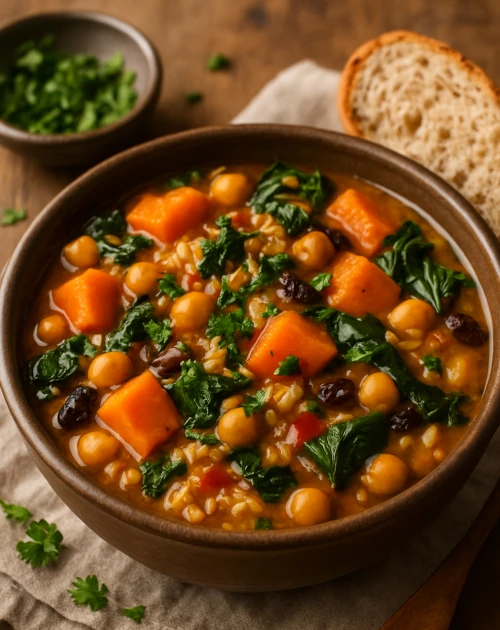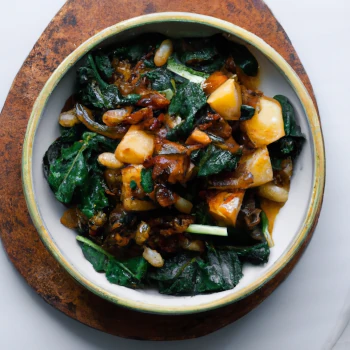African Vegetable Stew

Embark on a culinary journey with this African Vegetable Stew, a dish that brims with robust flavors and nutritious ingredients. Crafted with an array of fresh vegetables, protein-rich garbanzo beans, and a hint of Tabasco for that extra zing, this stew is not just a meal, but an experience that promises to delight your palate.
Rooted in the rich and diverse culinary traditions of Africa, this stew is a testament to the continent's vast array of vibrant flavors and wholesome ingredients. Each spoonful warms you body and soul, right from the comfort of your kitchen. So, whether you're looking to expand your culinary repertoire or simply craving a hearty, nutritious meal, this African Vegetable Stew is the perfect choice.

Ingredients
1 large onion, chopped 1 bunch swiss chard 1 15 oz can (425 g) garbanzo beans 1⁄2 cup raisins 1⁄2 cup rice 2 sweet potatoes Several fresh tomatoes (or a large can) 2 cloves garlic clove Salt and pepper Tabasco sauce
Method
- 1. Begin by sautéing the onion, garlic, and white stems of the chard until they're just tender.
- 2. Incorporate the chopped greens and continue to sauté for a few more minutes.
- 3. Either peel the sweet potatoes or give them a good scrub with a vegetable brush, then cut them into thick slices.
- 4. Add the garbanzo beans, raisins, sweet potatoes, tomatoes, salt, and pepper to the pot and let it cook for a couple of minutes.
- 5. Create a well in the center of the mixture in the pot. Place the rice in the well and press it down until it's wet.
- 6. Cover the pot and let it cook until the rice is done, which should take about 60 minutes.
- 7. Finally, add Tabasco sauce to taste and serve.

The Art of African Cooking

African cuisine is a vast and varied tapestry of flavors, techniques, and traditions, reflecting the continent's diverse cultures, climates, and histories. From the fragrant tagines of North Africa to the fiery stews of West Africa, each region contributes its unique ingredients and culinary approaches to this rich gastronomic landscape. Our Vegetable Stew is a humble nod to this expansive culinary tradition, embodying the essence of a good, hearty stew with a unique blend of flavors.
Stews hold a special place in many African cultures, serving as communal dishes that bring families and communities together. They are often brimming with a variety of vegetables, legumes, and spices, served alongside staple carbohydrates like rice or bread. This particular stew features garbanzo beans, or chickpeas, a nutrient-dense legume that is a staple in many African and Middle Eastern diets.
The inclusion of Swiss chard, sweet potatoes, and tomatoes not only adds a burst of color but also a symphony of flavors and a powerhouse of nutrients. The hint of Tabasco sauce lends a spicy kick, a nod to the love of heat in many African cuisines, but can be adjusted to suit individual palates.
However, the story of this stew, like many dishes we enjoy today, transcends borders and oceans. The African diaspora, a result of the transatlantic slave trade, had a profound impact on global food culture. Enslaved Africans brought with them their culinary traditions, adapting and evolving them according to the ingredients available in their new homes. This fusion of food cultures gave birth to new culinary creations, a silver lining in a chapter of history that reflects the worst of humanity.
Today, we can see the influences of African cuisine in dishes around the world, from the Southern United States to the Caribbean and beyond. This Vegetable Stew is a testament to this culinary journey, a dish that carries within it echoes of the past and the resilience of cultures.
Whether you're a seasoned food explorer or just beginning your culinary journey, this Vegetable Stew is a wonderful starting point. Relish it as a comforting dinner, or whip up a batch for a week's worth of nutritious, flavorful lunches. As you savor each spoonful, appreciate the journey it represents, from its humble origins to the warmth of your kitchen.